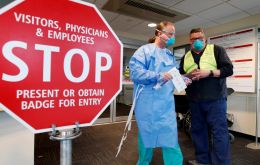MercoPress. South Atlantic News Agency
Tag: diabetes
-
Monday, February 2nd 2026 - 02:48 UTC
Over 60% of Brazilians are overweight as obesity doubles in 18 years, survey shows

More than six in ten Brazilians are now overweight and obesity affects roughly one in four adults, according to official health data released this week and carried by Agência Brasil. The survey estimates that 62.6% of the population had excess weight in 2024, up from 42.6% in 2006, while obesity (BMI ≥ 30) doubled from 11.8% to 25.7% over the same period.
-
Monday, March 10th 2025 - 15:55 UTC
Brazil's Anvisa approves weekly insulin to treat diabetes 1 and 2

Brazil's National Health Surveillance Agency (Anvisa) has approved the drug Awiqli, produced by the pharmaceutical company Novo Nordisk, to treat adult patients with type 1 and 2 diabetes, Agencia Brasil reported. It is the first weekly insulin shot in the world. There is no date for launching it nationwide.
-
Saturday, November 14th 2020 - 08:34 UTC
WHO's message on World Diabetes Day; it affects 6% of world population

This year’s World Diabetes Day, Saturday 14 November, falls during a global pandemic which has already taken the lives of well over a million people. People with diabetes are paying a particularly high price. Not only do they have a higher risk of severe COVID-19 disease and death when infected, but many are having difficulty accessing the treatment they need due to disruptions to essential health services.
-
Wednesday, August 19th 2020 - 07:09 UTC
Diabetes Type 1 among children in UK almost doubled during Covid-19 peak, Imperial College

Cases of type 1 diabetes among children in a small UK study almost doubled during the peak of Britain's COVID-19 epidemic, suggesting a possible link between the two diseases that need more investigation, scientists said on Tuesday.
-
Wednesday, April 1st 2020 - 07:40 UTC
Most coronavirus patients in US with underlying diabetes, heart disease and long term lung problems

Diabetes, heart disease and long-term lung problems are the most common underlying conditions among Americans hospitalized with the illness caused by the new coronavirus, but more than one in five people requiring intensive care had no such health issues, according to a report issued on Tuesday.
-
Friday, November 15th 2019 - 09:08 UTC
Diabetes epidemic affects 460 million, 1 in 11 adults and is top-10 killer worldwide

More than 460 million people - 1 in 11 adults - now suffer from diabetes, largely brought on by an over-rich lifestyle short on exercise, the International Diabetes Federation (IDF) said on Thursday.
-
Wednesday, November 7th 2018 - 08:39 UTC
Lobbying in UK to impose a price-hiking “meat tax” to prevent 6.000 deaths annually

A price-hiking “meat tax” could prevent almost 6,000 deaths per year in the UK and save the economy more than £70 million in avoided healthcare costs, say researchers Globally, meat taxes could save an estimated 220,000 lives by 2020 and reduce healthcare costs by £30.7 billion, a study has found.
-
Tuesday, January 12th 2016 - 06:30 UTC
Five cups of coffee a day good for the heart and to combat diabetes, says 10-year study

A major US study has found that people who drink up to five cups of coffee daily are less likely to die from health issues such as heart disease and diabetes compared to those who don’t drink coffee at all. The 10-year study found that the more coffee people drank, the less likely they were to die early. The results were similar with people who drank decaffeinated coffee.
-
Saturday, November 14th 2015 - 12:02 UTC
World Diabetes Day, 14 November; 350 million people suffer the chronic disease

The World Health Organization is marking World Diabetes Day on 14th November calling for greater action to turn the growing tide of the global diabetes epidemic and has announced that World Health Day, on 7 April will focus on the issue of diabetes.
-
Tuesday, October 8th 2013 - 06:38 UTC
Nobel medicine prize for work on how hormones are transported in and outside cells

Americans James Rothman and Randy Schekman and Germany's Thomas Suedhof won the 2013 Nobel medicine prize for their work on how hormones are transported within and outside cells, giving insight into diseases such as diabetes and Alzheimer's.
